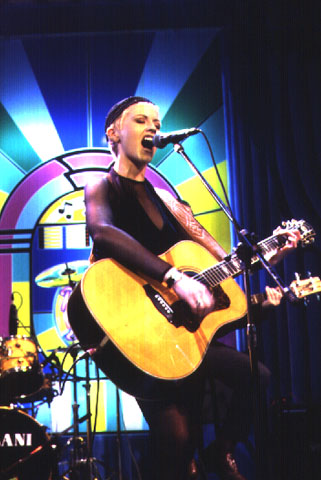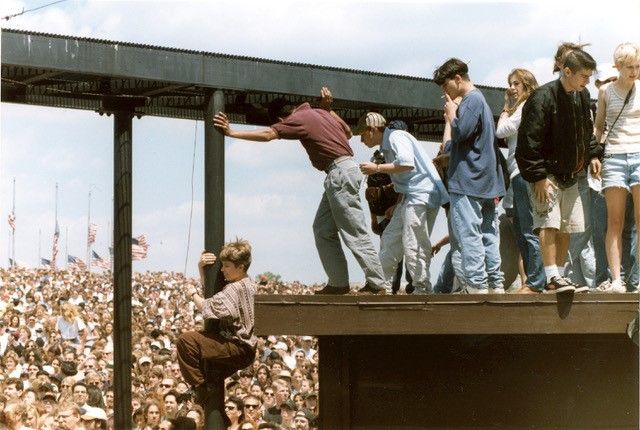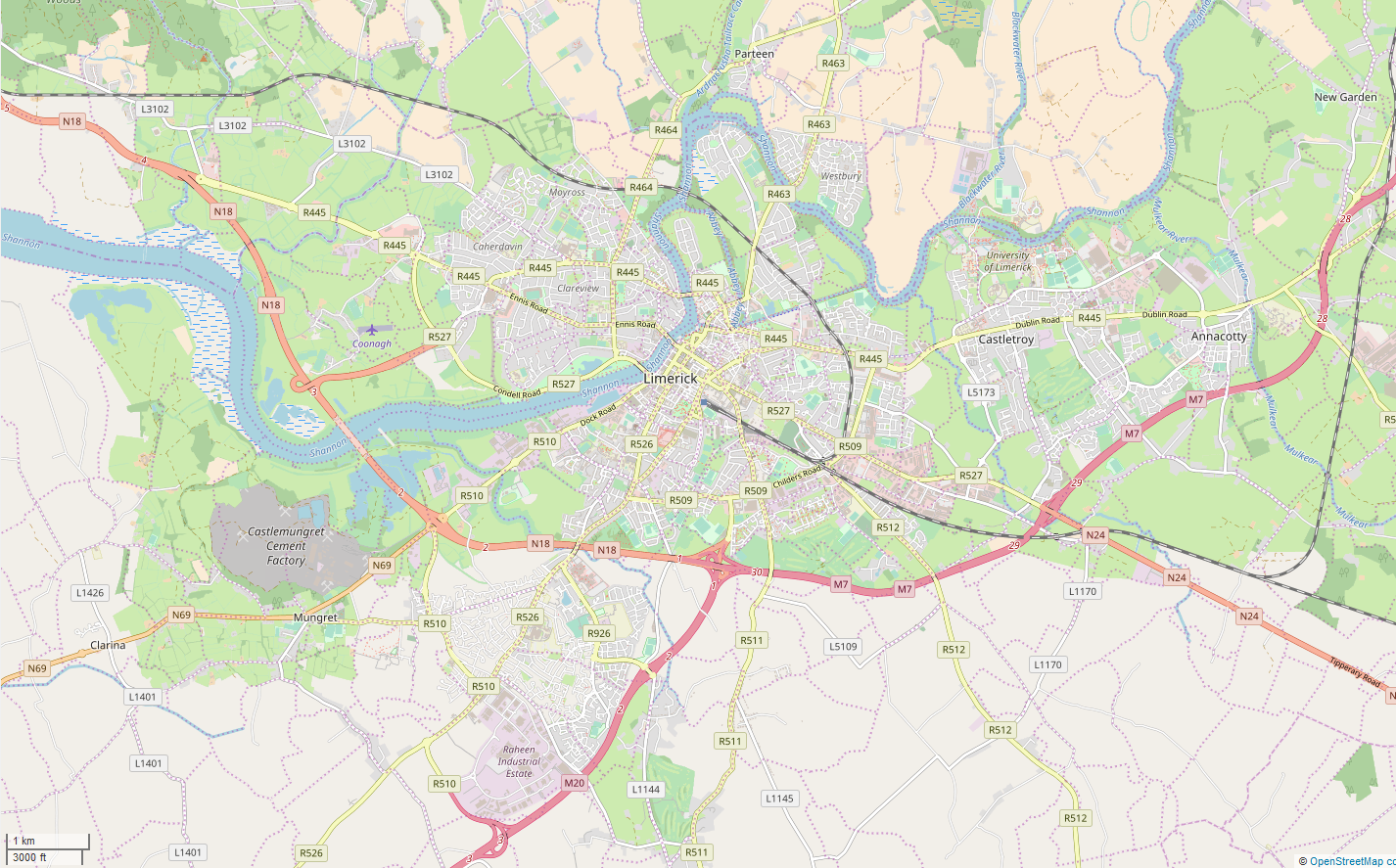|
Ballybricken
Ballybricken () is an area in the east of County Limerick in Ireland. It is in the Civil parishes in Ireland, civil parish of Caherelly, approximately 18 kilometres (11 miles) from Limerick city. Ballybricken is mainly a farming area. Sport Ballybricken's local Gaelic Athletic Association, GAA club, officially named Ballybricken/Bohermore GAA Club, has its grounds in the area. A new clubhouse was officially opened on the May Bank Holiday weekend in 2008. The Ballybricken/Bohermore GAA senior teams play at a Junior A level in both hurling and football. Community Ballybricken has a shop/post office and pub (Kirby's "Hunting Lodge"). Other businesses located in Ballybricken include Mr Binman and Tucon Engineering Company Ltd. Dolores O'Riordan from The Cranberries was brought up in Ballybricken and went to the local primary school. References External linksBallybricken GAA {{Authority control Towns and villages in County Limerick ... [...More Info...] [...Related Items...] OR: [Wikipedia] [Google] [Baidu] |
Dolores O'Riordan
Dolores Mary Eileen O'Riordan ( ; 6 September 1971 – 15 January 2018) was an Irish musician, singer and songwriter. She was best known as the lead vocalist and lyricist for the alternative rock band the Cranberries. One of the most recognizable voices in rock in the 1990s, she was known for her lilting mezzo-soprano voice, signature yodel, emphasized use of keening, and strong Limerick accent. O'Riordan was born in County Limerick, Ireland, to a Catholic working-class family. She began to perform as a soloist in her church choir before leaving secondary school to join the Cranberries in 1990. Recognised for her "unique" voice, she quickly achieved worldwide fame. During her lifetime, she released seven studio albums with the Cranberries, including four number-one albums. Over the years, she contributed to the release of ''Everybody Else Is Doing It, So Why Can't We?'' (1993), ''No Need to Argue'' (1994), ''To the Faithful Departed'' (1996), ''Bury the Hatchet'' (1999) and ''W ... [...More Info...] [...Related Items...] OR: [Wikipedia] [Google] [Baidu] |
Caherelly
Caherelly () is a civil parish in County Limerick, Ireland. Caherelly National School, also known as Scoil Ailbhe, is the local national (primary) school. The local Gaelic Athletic Association club, Ballybricken/Bohermore GAA Club, has its grounds in the area. See also * Ballybricken Ballybricken () is an area in the east of County Limerick in Ireland. It is in the civil parish of Caherelly, approximately 18 kilometres (11 miles) from Limerick city. Ballybricken is mainly a farming area. Sport Ballybricken's local GAA c ..., a townland within the civil parish References Civil parishes of County Limerick {{Limerick-geo-stub ... [...More Info...] [...Related Items...] OR: [Wikipedia] [Google] [Baidu] |
List Of Sovereign States
The following is a list providing an overview of sovereign states around the world with information on their status and recognition of their sovereignty. The 206 listed states can be divided into three categories based on membership within the United Nations System: 193 UN member states, 2 UN General Assembly non-member observer states, and 11 other states. The ''sovereignty dispute'' column indicates states having undisputed sovereignty (188 states, of which there are 187 UN member states and 1 UN General Assembly non-member observer state), states having disputed sovereignty (16 states, of which there are 6 UN member states, 1 UN General Assembly non-member observer state, and 9 de facto states), and states having a special political status (2 states, both in free association with New Zealand). Compiling a list such as this can be a complicated and controversial process, as there is no definition that is binding on all the members of the community of nations concerni ... [...More Info...] [...Related Items...] OR: [Wikipedia] [Google] [Baidu] |
Civil Parishes In Ireland
Civil parishes () are units of territory in the island of Ireland that have their origins in old Gaelic territorial divisions. They were adopted by the Anglo-Norman Lordship of Ireland and then by the Elizabethan Kingdom of Ireland, and were formalised as land divisions at the time of the Plantations of Ireland. They no longer correspond to the boundaries of Roman Catholic or Church of Ireland parishes, which are generally larger. Their use as administrative units was gradually replaced by Poor_law_union#Ireland, Poor Law Divisions in the 19th century, although they were not formally abolished. Today they are still sometimes used for legal purposes, such as to locate property in deeds of property registered between 1833 and 1946. Origins The Irish parish was based on the Gaelic territorial unit called a ''túath'' or ''Trícha cét''. Following the Norman invasion of Ireland, the Anglo-Normans, Anglo-Norman barons retained the ''tuath'', later renamed a parish or manor, as a un ... [...More Info...] [...Related Items...] OR: [Wikipedia] [Google] [Baidu] |
The Cranberries
The Cranberries were an Irish rock band formed in Limerick, Ireland. Originally named the Cranberry Saw Us, the band were formed in 1989 by lead singer Niall Quinn, guitarist Noel Hogan, bassist Mike Hogan and drummer Fergal Lawler. Quinn was replaced as lead singer by Dolores O'Riordan in 1990 and they changed their name to the Cranberries. The band classified themselves as an alternative rock group, but incorporated aspects of indie rock, jangle pop, folk rock, post-punk and pop rock into their sound. The Cranberries rose to international fame in the 1990s with their debut album, ''Everybody Else Is Doing It, So Why Can't We?'', which became a commercial success. Some of the band's hit singles include "Dreams" (1992), " Linger" (1993), "Zombie" (1994), "Salvation" (1996), and " When You're Gone" (1997). Five of the band's albums reached the Top 20 on the ''Billboard'' 200 chart and eight of their singles reached the Top 20 on the Modern Rock Tracks chart. In early 2009, af ... [...More Info...] [...Related Items...] OR: [Wikipedia] [Google] [Baidu] |
Bank Holiday
A bank holiday is a national public holiday in the United Kingdom, Republic of Ireland and the Crown Dependencies. The term refers to all public holidays in the United Kingdom, be they set out in statute, declared by royal proclamation or held by convention under common law. The term "bank holiday" refers to the fact that banking institutions typically close for business on such holidays, as they once used to do on certain Saint's days. List of current holidays Notes See also * List of holidays by country * Bank Holidays Act 1871 * Proposed St David's Day bank holiday Saint David's Day is currently not a bank holiday in Wales. Some Welsh politicians have proposed that St David's Day, a celebration of Welsh identity, observed on 1 March, be designated as a public holiday. Polls show the proposal to have majori ... References External links UK bank holidaysScotland Bank Holidays - Scottish Government* {{DEFAULTSORT:Bank Holiday British culture Irish cul ... [...More Info...] [...Related Items...] OR: [Wikipedia] [Google] [Baidu] |
Gaelic Athletic Association
The Gaelic Athletic Association (GAA; ga, Cumann Lúthchleas Gael ; CLG) is an Irish international amateur sporting and cultural organisation, focused primarily on promoting indigenous Gaelic games and pastimes, which include the traditional Irish sports of hurling, camogie, Gaelic football, Gaelic handball and rounders. The association also promotes Irish music and dance, as well as the Irish language. As of 2014, the organisation had over 500,000 members worldwide, and declared total revenues of €65.6 million in 2017. The Games Administration Committee (GAC) of the Gaelic Athletic Association (GAA) governing bodies organise the fixture list of Gaelic games within a GAA county or provincial councils. Gaelic football and hurling are the most popular activities promoted by the organisation, and the most popular sports in the Republic of Ireland in terms of attendances. Gaelic football is also the second most popular participation sport in Northern Ireland. The women' ... [...More Info...] [...Related Items...] OR: [Wikipedia] [Google] [Baidu] |
Limerick
Limerick ( ; ga, Luimneach ) is a western city in Ireland situated within County Limerick. It is in the province of Munster and is located in the Mid-West which comprises part of the Southern Region. With a population of 94,192 at the 2016 census, Limerick is the third-most populous urban area in the state, and the fourth-most populous city on the island of Ireland at the 2011 census. The city lies on the River Shannon, with the historic core of the city located on King's Island, which is bounded by the Shannon and Abbey Rivers. Limerick is also located at the head of the Shannon Estuary, where the river widens before it flows into the Atlantic Ocean. Limerick City and County Council is the local authority for the city. Geography and political subdivisions At the 2016 census, the Metropolitan District of Limerick had a population of 104,952. On 1 June 2014 following the merger of Limerick City and County Council, a new Metropolitan District of Limerick was formed within ... [...More Info...] [...Related Items...] OR: [Wikipedia] [Google] [Baidu] |
Irish Grid Reference System
The Irish grid reference system is a system of geographic grid references used for paper mapping in Ireland (both Northern Ireland and the Republic of Ireland). The Irish grid partially overlaps the British grid, and uses a similar co-ordinate system but with a meridian more suited to its westerly location. Usage In general, neither Ireland nor Great Britain uses latitude or longitude in describing internal geographic locations. Instead grid reference systems are used for mapping. The national grid referencing system was devised by the Ordnance Survey, and is heavily used in their survey data, and in maps (whether published by the Ordnance Survey of Ireland, the Ordnance Survey of Northern Ireland or commercial map producers) based on those surveys. Additionally grid references are commonly quoted in other publications and data sources, such as guide books or government planning documents. 2001 recasting: the ITM grid In 2001, the Ordnance Survey of Ireland and the Ordnance Su ... [...More Info...] [...Related Items...] OR: [Wikipedia] [Google] [Baidu] |
Republic Of Ireland
Ireland ( ga, Éire ), also known as the Republic of Ireland (), is a country in north-western Europe consisting of 26 of the 32 counties of the island of Ireland. The capital and largest city is Dublin, on the eastern side of the island. Around 2.1 million of the country's population of 5.13 million people resides in the Greater Dublin Area. The sovereign state shares its only land border with Northern Ireland, which is part of the United Kingdom. It is otherwise surrounded by the Atlantic Ocean, with the Celtic Sea to the south, St George's Channel to the south-east, and the Irish Sea to the east. It is a unitary, parliamentary republic. The legislature, the , consists of a lower house, ; an upper house, ; and an elected President () who serves as the largely ceremonial head of state, but with some important powers and duties. The head of government is the (Prime Minister, literally 'Chief', a title not used in English), who is elected by the Dáil and appointed by ... [...More Info...] [...Related Items...] OR: [Wikipedia] [Google] [Baidu] |
Western European Summer Time
Western European Summer Time (WEST, UTC+01:00) is a summer daylight saving time scheme, 1 hour ahead of Greenwich Mean Time and Coordinated Universal Time. It is used in: * the Canary Islands * Portugal (including Madeira but not the Azores) * the Faroe Islands The following countries also use the same time zone for their daylight saving time but use a different title: *United Kingdom, which uses British Summer Time (BST) *Ireland, which uses Irish Standard Time (IST) ( (ACÉ)). Also sometimes erroneously referred to as "Irish Summer Time" (). The scheme runs from the last Sunday in March to the last Sunday in October each year. At both the start and end of the schemes, clock changes take place at 01:00 UTC+00:00. During the winter, Western European Time (WET, GMT+0 or UTC±00:00) is used. The start and end dates of the scheme are asymmetrical in terms of daylight hours: the vernal time of year with a similar amount of daylight to late October is mid-February, well before ... [...More Info...] [...Related Items...] OR: [Wikipedia] [Google] [Baidu] |
Irish Standard Time
Republic of Ireland, Ireland uses Irish Standard Time (IST, UTC+01:00; ga, Am Caighdeánach Éireannach) in the summer months and Greenwich Mean Time (UTC+00:00; ''Meán-Am Greenwich'') in the winter period. (Roughly half of the state is in the 7.5°W to 22.5°W sector, half is in the same sector as Greenwich: 7.5°E to 7.5°W). In Ireland, the Standard Time Act 1968 legally established that ''the time for general purposes in the State (to be known as standard time) shall be one hour in advance of Greenwich mean time throughout the year''. This act was amended by the Standard Time (Amendment) Act 1971, which legally established Greenwich Mean Time as a winter time period. Ireland therefore operates one hour behind standard time during the winter period, and reverts to standard time in the summer months. This is defined in contrast to the other states in the European Union, which operate one hour ahead of standard time during the summer period, but produces the same end result. ... [...More Info...] [...Related Items...] OR: [Wikipedia] [Google] [Baidu] |






_Act_1916.jpg)